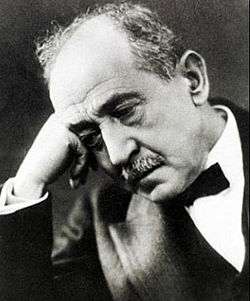Ahmed Shawqi
| Ahmed Shawqi أحمد شوقي | |
|---|---|
|
Portrait of Ahmed Shawqi. | |
| Born |
October 16, 1868 Cairo, Khedivate of Egypt |
| Died |
October 14, 1932 (aged 63) Cairo, Kingdom of Egypt |
| Occupation | Playwright, poet |
Ahmed Shawqi (1868–1932) (Arabic: أحمد شوقي, Egyptian Arabic pronunciation: [ˈʔæħmæd ˈʃæwʔi]), also written as Ahmed Chawki, nicknamed Amīr al-Shu‘arā’ (The Prince of Poets, Arabic: أمير الشعراء), was one of the greatest Arabic poets laureate,[1] an Egyptian poet and dramatist who pioneered the modern Egyptian literary movement, most notably introducing the genre of poetic epics to the Arabic literary tradition.
Life
Raised in a privileged setting with Kurdish, Circassian, Greek, and Egyptian roots,[2] his family was prominent and well-connected with the court of the Khedive of Egypt. Upon graduating from high school, he attended law school, obtaining a degree in translation. Shawqi was then offered a job in the court of the Khedive Abbas II,who was the khedive of Egypt, which he immediately accepted.
After a year working in the court of the Khedive, Shawqi was sent to continue his studies in Law at the Universities of Montpellier and Paris for three years. While in France, he was heavily influenced by the works of French playwrights, most notably Molière and Racine. He returned to Egypt in 1894, and remained a prominent member of Arab literary culture until the British forced him into exile in southern Spain, Andalusia, in 1914. Shawqi remained there until 1920, when he returned to Egypt. In 1927 he was crowned by his peers Amir al-Sho’araa’ (literally, "the Prince of Poets") in recognition of his considerable contributions to the literary field.
He used to live in ‘Karmet Ibn Hani’ or Ibn Hani’s Vineyard at Al-Matariyyah area near the palace of the Khedive Abbas II at Saray El-Qobba until he was exiled. After returning to Egypt he built a new house at Giza which he named the new Karmet Ibn Hani.[3] He met Mohammed Abdel Wahab, and introduced him for the first time to art, making him his protégé as he gave him a suite in his house. The house later on became Ahmed Shawki Museum and Mohammed Abdel Wahab became one of the most famous Egyptian composers.
Legacy
Shawqi’s work can be categorized into three main periods during his career. The first coincides with the period during which he occupied a position at the court of the Khedive, consisting of eulogies to the Khedive: praising him or supporting his policy. The second comprised the period of his exile in Spain. During this period, his feeling of nostalgia and sense of alienation directed his poetic talent to patriotic poems on Egypt as well as the Arab world and panarabism. The third stage occurred after his return from exile, during that period he became preoccupied with the glorious history of Ancient Egypt and Islam. This was the period during which he wrote his religious poems, in praise of the Prophet Muhammad. The maturation of his poetic style was also reflected in his plays, the most notable of which were published during this period.
Plays

Shawqi was the first in modern Arabic literature to write poetic plays. He wrote five tragedies:
- Majnun Laila (literally "The Mad about Layla"), his first play.
- The Death of Cleopatra
- 'Antara
- Ali bek el-Kabeer
- Qambeez (Cambyses II), 1931
and two comedies:
- Es-Set Huda (Madam Huda)
- El-Bakhila (the Miser-ette)
in addition to a prose play: the Princess of Andalusia.
Poetry
- Esh-Shawqiyyat, his selected works, in four volumes, including Nahj al-Burda, a tribute to the Prophet Muhammad
- The States of Arabs and the Great Men of Islam, A long poem about the History of Islam.
- Poetic Stories for Children, inspired by the famous French fabulist Jean de La Fontaine.
Prose
He also wrote chapters of prose, collected under the title: The Markets of Gold.
Legacy in Egypt
- His home was turned into Ahmed Shawki Museum
- The street of his home in Giza was named after him.
- Many statues were erected to honor him inside & outside Egypt.
- Shawqi is celebrated in several parts of the world and in Egypt there is a monthly lecture series about his poetry at the Sawy Culture wheel.
- A postage stamp was issued in the 1990s in Egypt to honor his memory.
- Google made a doodle for him on selected Arabic-speaking countries on October 16, 2010 in honor of his memory[4]
- Many books were written about his life.[5]
Notes
- ↑ Egypt. "Poet Laurate". Tripadvisor.com. Retrieved 2012-12-20.
- ↑ Shahid, Irfan (2010), "Ahmad Shawqi (1868-1932)", in Allen, Roger M. A.; Lowry, Joseph Edmund; Stewart, Devin J. (eds.), Essays in Arabic Literary Biography: 1850-1950, p. 305, ISBN 3447061413
- ↑ My Father Shawky by Hussin Ahmed Shawky 2nd edition (in arabic) General authority of culture palaces 2006 Cairo
- ↑ "Google & Ahmed Shawki". Retrieved 2012-12-20.
- ↑ "Biblotica Alexandrina List of Books about Ahmed Shawki (in Arabic)" (PDF). Retrieved 2012-12-20.
References
- Glimpses of Ahmed Shawqi’s Life and Works, Egypt Magazine, Issue No. 19-Fall 1999.
External links
| Arabic Wikisource has original text related to this article: |
| Wikimedia Commons has media related to Ahmed Shawqi. |
